Quarterly Newsletter - January 2022 - Issue No. 13
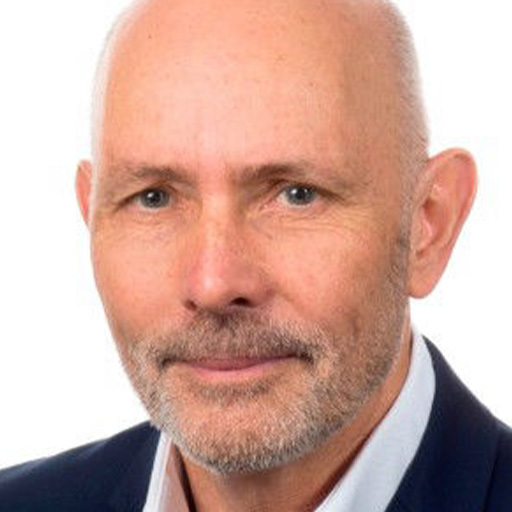
|
Welcome to the thirteenth edition of the Global Psoriasis Atlas (GPA) newsletter. I do hope that you all managed to find some time to relax over the December holidays after another COVID-induced year. Let us hope we can retain a sense of normality in 2022 as and when travelling for work resumes, allowing us to meet face-to-face again after two years of Zoom and Teams! I would like to thank our Coordinators, administrative team and research collaborators for continuing to work diligently in support of the GPA despite the contingencies of the pandemic.
|
|
A few members of the GPA team had a successful trip to London in December to attend the 9th Congress of Psoriasis: From Gene to Clinic which I co-organised and co-chaired with Professor Jonathan Barker (St John’s Institute of Dermatology). We founded this premier psoriasis meeting 25 years ago. Professor Darren Ashcroft was an invited speaker and presented updates on the GPA progress whilst Dr Alex Trafford presented his PhD work examining cancer events in patients with psoriasis. I would like to take this opportunity to congratulate Alex for completing his PhD and wish him all the best in his future endeavours.
|
|
Our global collaborations continue to gather pace as research continues with colleagues in Newfoundland, Qatar and Taiwan. We are looking forward to travelling to Greenland in May this year to conduct a pilot study in Tasiilaq on the Eastern seaboard with Professors Jacob P. Thyssen and Claus Zachariae (Copenhagen). Quite a contrast to our last fieldtrip to Tanzania in 2019.
|
|
Our GPA Medical Coordinator, Dr Tatjana Maul, has been in contact with all of our Regional Coordinators with details on how to register their centres to participate in the GPA Global Healthcare Study. The purpose of the study is to enable further mapping of psoriasis and access to care on a local and regional level and to help us gain a better understanding of common psoriasis characteristics. An important piece of work.
|
|
Meanwhile, I do hope you and your families have had a safe and successful start to the New Year.
|
|
With my best wishes, |
Research Update
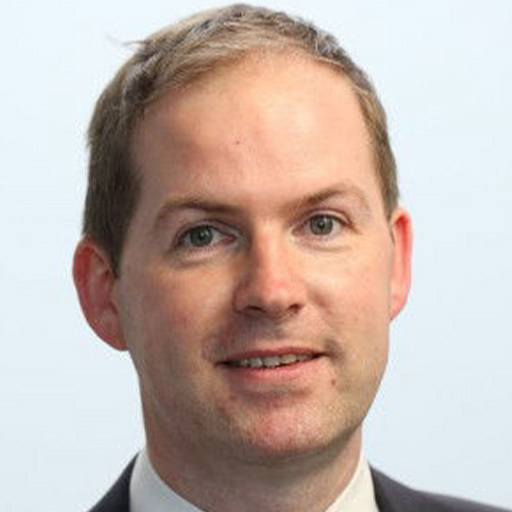
Professor Darren Ashcroft
GPA Research Director
|
Medical Coordinator Update
IRASPEN

PD Dr Julia-Tatjana Maul
GPA Medical Coordinator
|
|
|
The IRASPEN team, led by Principle Investigator, PD. Dr Julia-Tatjana Maul, and Professor Alexander Navarini, are delighted to report enrolment of the first 8 patients in the study in Switzerland (Zürich and Basel). This is an important first step towards gaining insights into the natural course of pustular psoriasis, disease burden, therapeutics and genetics. The team also hope to open two study sites in the UK, working with Professor Jonathan Barker and Professor Chris Griffiths. A number of other sites around the world are at various stages of the ethics approval process and will be joining the study in the near future.
|
|
We are grateful to all the Regional Coordinators who have expressed an interest in assisting with recruitment to the IRASPEN registry and look forward to working with you on this study.
|
|
Please continue to share the following information with your colleagues and across your networks:
|
|
The IRASPEN registry is a global, prospective registry, investigating the genotype-phenotype correlation of pustular psoriasis (PP). IRASPEN comprises the prospective collection of data and biological material from multiple, global sites: |
|
|
|
The sub study IRASPEN-CS is a cross-sectional design comprising a one-time collection of data based on the first visit of the IRASPEN main project.
|
|
Objectives of the registry
|
|
|
Primary and secondary endpoints
|
|
|
The variable of primary interest (corresponding to an endpoint in a clinical trial) is the PGA / IGA severity grade, and as it is an observational study, both the first as well as all other visits are relevant.
|
|
PD. Dr. Maul is keen for all GPA Regional and National Coordinators and dermatologists from around the world to contribute to the study. The electronic case report form, information on ethical approval and reimbursement for the study can be provided on request. For further information, please contact: |
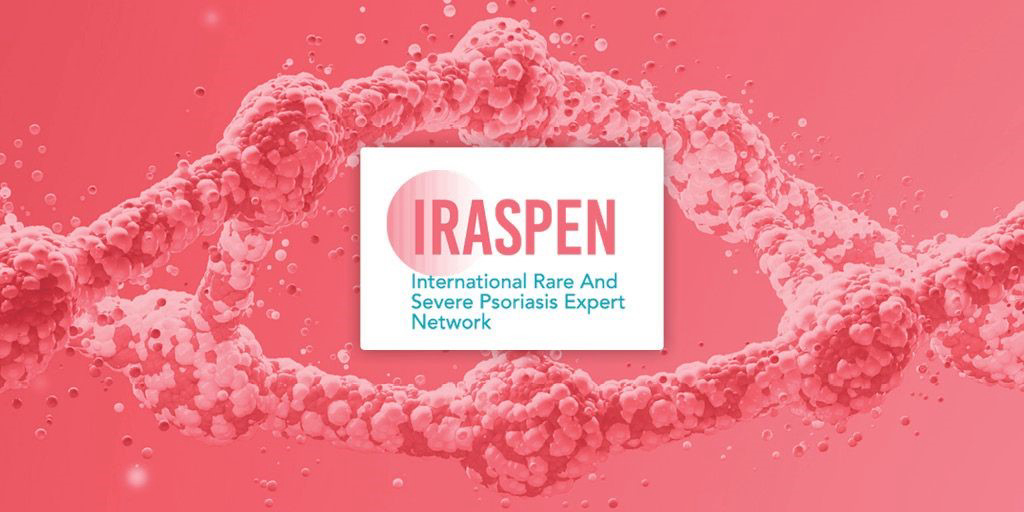
|
GPA Global Healthcare Study
|
||||||||||
|
Regional Coordinator Update: Daniela Armijo & Claudia De la Cruz
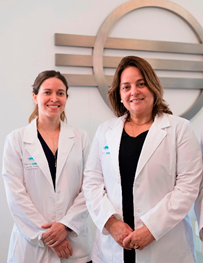
Dr Daniela Armijo & Dr Claudia De la Cruz
|
During 2021, Dr Claudia De la Cruz, Director of Clínica Dermacross, in Santiago, Chile and Dr Daniela Armijo, launched the campaign “Treating Psoriasis”, with the aim to provide information about all the different aspects of the disease and its available treatments to patients with psoriasis and their families.
|
|
We developed a web page (www.lapsoriasis.cl) and a book that we expect to deliver 1000 copies to patients with psoriasis, free of charge. We also developed an online survey that was available to be completed on the webpage. The objective was to collect sociodemographic data and information about access to treatment for psoriasis patients in order to contribute to the Global Psoriasis Atlas. We obtained 3192 valid answers, 69% were female and 31% male. 42% answered that they have at least 1 relative with psoriasis – psoriasis vulgaris and scalp psoriasis were the most common types. 65% of patients reported comorbidities, and obesity (26%), hypertension (20%), depression (16%), insulin resistance (15%), dyslipidaemia (12%) were the most frequent. 14% reported psoriatic arthritis. The majority were being treated with topicals, 30% said they were not receiving any treatment, and 9% were on methotrexate. Only 50 out of 3192 patients said they were on biologics: secukinumab > golimumab > etanercept > adalimumab > infliximab > guselkumab > risankizumab and the majority of them also had psoriatic arthritis (p<0.001). 20% of patients responded they had stopped working due to the disease; the majority had psoriatic arthritis (p<0.001). The results suggest that access to biologics is limited, probably due to high costs. We aim to continue with the campaign in 2022, collecting new data about the epidemiology of psoriasis. |
Congratulations Dr Alex Trafford!

The GPA team would like to congratulate Alex Trafford for completing his PhD and officially gaining the title Dr! Alex has been an integral member of the research team in Manchester and has accumulated a number of achievements during the length of his PhD, including the publication of his systematic review in JAMA Dermatology in 2019. We wish Alex the best of luck in his new role as a Research Associate in the Division of Pharmacy and Optometry.
9th International Congress – Psoriasis: from Gene to Clinic
Members of the GPA team were pleased to be able to attend their first in-person congress since the start of the pandemic – the 9th international congress of the triennial psoriasis meeting, held over from 2020, Psoriasis: from Gene to Clinic, co-founded and co-chaired by Professors Chris Griffiths and Jonathan Barker. Professor Darren Ashcroft presented on the epidemiology of psoriasis and the GPA. Dr Alex Trafford presented the findings from his PhD studying psoriasis and cancer incidence and mortality. GPA Programme Manager, Rebekah Swan also attended the congress and shared a variety of resources to help to promote the work of the GPA.
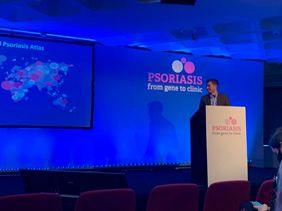
Dr Alex Trafford presenting the findings from his PhD

GPA resources and promotion
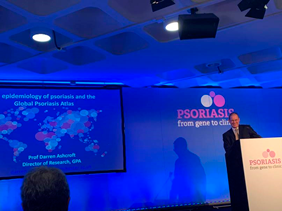
Professor Darren Ashcroft presenting on the epidemiology of psoriasis and the GPA
Greenland
The GPA team will join colleagues from Denmark, Switzerland and the UK to undertake the planned pilot survey in Tasiilaq, Eastern Greenland in May 2022. The intention is for this preliminary study to link to the national population health survey that will take place in Greenland in 2023. Ethical approval is now in place and the overarching purpose of the study will be to assess the point prevalence of psoriasis and atopic dermatitis. Furthermore, the ethical approval allows for the collection of skin and mouth swabs for skin microbiome, DNA and epigenetic samples. The team will also collect data on other skin diseases.

Psoriasis Training Tool
|
Psoriasis affects almost three in every hundred people in the UK. Patients first attend a GP clinic before being referred to a dermatologist for their skin problems. To provide better medical care, GPA PhD student, Maha Abo-Tabik, developed an educational resource (tool) for psoriasis based on the findings from our recent e-Delphi study. The tool is intended to be used by primary health care professionals to improve their knowledge about psoriasis presentation and consequently support them in making an accurate diagnosis of the skin disease.
|
|
The study has been included in the National Institute of Health Research (NIHR) portfolio and was adopted by the Clinical Research Network (CRN) to facilitate participant recruitment. Currently, we are in the participant recruitment stage. We expect to reach the number of participants needed for the study in the coming few weeks. In the meantime, we will start reviewing and analysing available data.
|
|
We aim to publish the outcome of this online research project in one of the highly ranked peer reviewed journals.
|
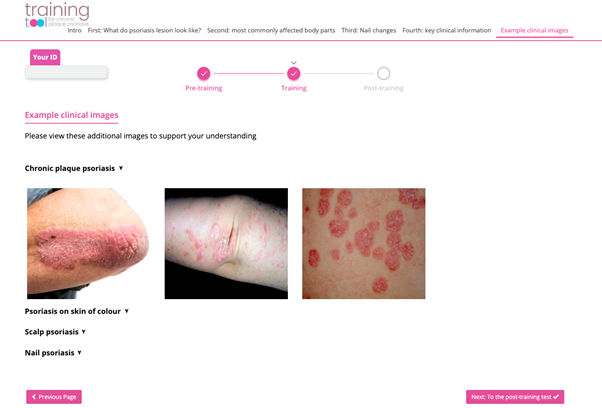
The Regional Dermatology Training Centre (RDTC) 27th CME Conference, Moshi, Tanzania
The 27th RDTC International CME Conference took place between the 12th and 15th of January. This was a hybrid meeting with delegates from sub-Saharan Africa and further afield in attendance. GPA Director, Professor Chris Griffiths, presented a summary of the findings from the GPA’s field study in Tanzania in 2019. He also discussed the difficulties in managing the disease in that part of the world emphasising that psoriasis is often first diagnosed as a fungal infection in Tanzania and treated accordingly. GPA Medical Coordinator, PD Dr Tatjana Maul, presented the findings from her field trip across Latin America in January 2020.
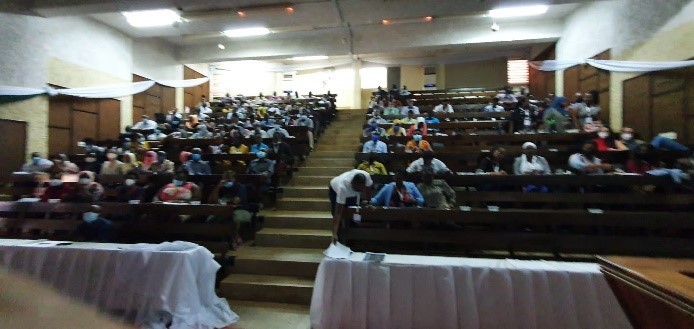

Upcoming Meetings
-
GPA Strategic Review Meeting:
Monday 14th March – The GPA team and Collaborating Organisations will meet to review progress during Phase II of the Atlas and to conduct short, medium and long term strategic planning.
-
American Academy of Dermatology Annual Meeting, Boston USA:
25th – 29th March 2022– GPA Steering Committee and Board Meeting, 26th March, 2022 (times TBC, meetings will be hybrid)
-
European Academy of Dermatology and Venereology Congress, Milan, Italy:
7th-10th September 2022 (times TBC, meetings will be hybrid)
